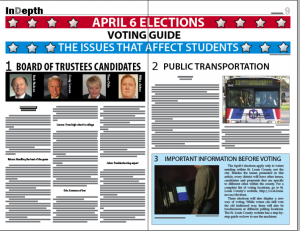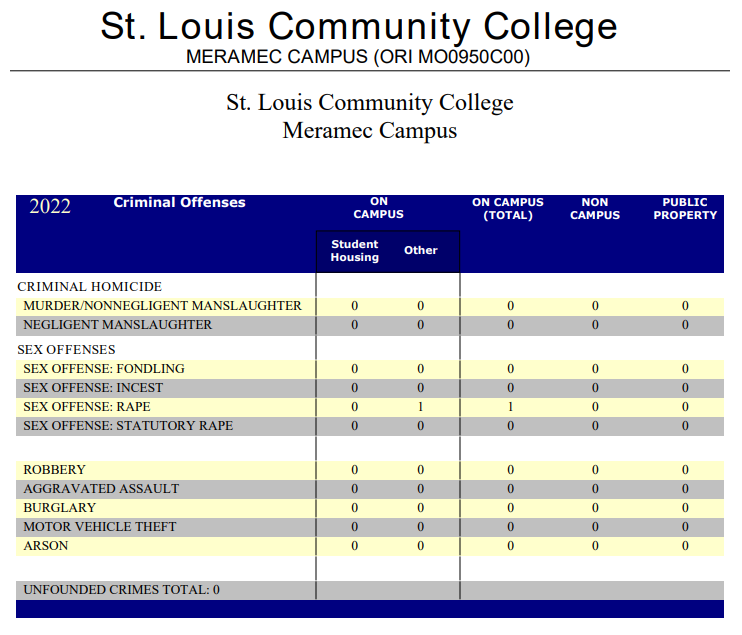The issues that affect students.

Carlos Restrepo
– Editor in Chief –
The upcoming district elections are around the corner. On April 6, four candidates will contest for one seat of the board of trustees at St. Louis Community College. The board of trustees is a six-member board that represents the four subdistricts of the college service area.
“The board is responsible for determining the policies of the college within the legal framework established by statutes of the state of Missouri,” according to STLCC’s website. “The board makes all final decisions concerning employment, termination of services, expenditure of funds, contracts, establishment of new programs, student fees, tax levies and construction of facilities. Regular board meetings are scheduled each month and are open to the public.”
This year, Bob Nelson, of subdistrict 4, will be challenged by Craig Larson, Tina Odo and Mike Johns for his seat.
Nelson: Handling the heat of the game
Robert C. Nelson, of Kirkwood, was elected to the board in April 2004. He has faced tough times and made not-so-popular decisions. He is the only trustee to have been elected to position of chair for three consecutive years. Before becoming a board member, he was coach of both men’s and women’s basketball team at Forest Park.
“I spent half of my life with this college, and I firmly believe in it,” Nelson said. “I know what we’ve been through and what we are going to go through. I tell you it’s not going to be any fun.”
Nelson said “it’s not going to be fun” because of the 15 to 20 percent budget deficit the college may be facing in 2012, which will inevitably bring cuts in areas that affect the students.
“Our situation, it’s going to be worse, but we don’t know how much worse,” Nelson said.
Nelson said regarding child care center that he did not want to cut the program, but that it was an unavoidable decision in these tough financial times.
“I did not want to vote to cut child care,” Nelson said. “I was convinced that with the cost of child care, it would be better to cut that than to cut the number of classes that are available.”
If re-elected, Nelson said he wants more input in the decision-making process from faculty.
“I want to see faculty and staff have a greater voice in the overall decision-making process,” Nelson said. “I don’t like decisions to be made without their input.”
Nelson has a master’s degree in education from Kansas State University. His bachelor’s degree in history with a minor in physical education is also from KSU.
Larson: From high school to college
Craig H. Larson, Ed.D., retired from his position as Rockwood School District superintendent, which he held for seven years. Now he wants to graduate from his experience in high school and move on to college.
“I think I’m qualified. I’ve worked in some big school districts. Rockwood is a huge district, as is Parkway. I think they are comparable in size to the community college level,” Larson said. “I’ve run a lot of board meetings, I’ve seen a lot of school boards, good and bad, and I think it’s given me the knowledge to be effective.”
Larson said that if he gets elected, one of the ways he expects to get things accomplished is by working together with other board members and listening to their ideas.
“The most important thing is to listen. We don’t have to agree or even like each other, but if we don’t listen to each other, then how are we going to get better? How can we improve without working together?” Larson said. “I’m a collaborator by nature. I’m going to listen. That’s how you accomplish things.”
Larson’s received his doctorate in education from Saint Louis University. His master’s degree in curriculum and instruction and his bachelor’s degree in education are from the University of Kansas.
Odo: A woman of law
Tina A. Odo, J.D., knows the law and the ins and outs of St. Louis Community College.
In 1989, Odo, a member of the Missouri Bar Association, was hired as the college’s legal counsel, or in-house attorney, for the entire district. She stayed in that position until she retired almost 20 years later.
Odo said her experience with the college is what makes her the best candidate for board of trustees.
“I was very dedicated and I believed in the mission of the college. I truly know education expands minds and changes lives. I would like to continue to be involved in the institution,” Odo said.
Odo also said that after all those years of giving advice, she wants to “actually make decisions.”
Odo also said she disagrees with the recent decision of the board, such as the elimination of the Child Care Centers at Meramec and Forest Park.
“I am terribly disappointed with the vote on the closing of the day care centers at Meramec and Forest Park. Those are needed,” Odo said.
Another factor Odo said she would like to improve upon is the hiring of full- vs. part-time faculty members.
“I think the number of part-time faculty has increased dramatically over the years, and the value of a full-time faculty member cannot be overstated,” Odo said. “It’s important to be able to meet with students, to mentor students, to have the time to be on campus. If you are a part-time faculty and you are going in teaching one class on Monday, Wednesday and Friday, you don’t have the same level of dedication to the institution that I think we need.”
Odo’s juris doctorate is from Saint Louis University’s School of Law. Her bachelor’s degree in English is from the University of Missouri-St. Louis.
Johns: Troubleshooting expert
Robert M. Johns dealt with the technical difficulties of Meramec in the past as a system server analyst. As a board of trustees candidate, John said he will deal with the fiscal difficulties of the district.
“What I would offer that I have not seen before is an attitude of fiscal conservatism,” Johns said.
Johns said that during his time at the college he saw that the college’s practices were not beneficial toward the students, nor represented the tax-payers desires, but instead favored the salaries of those working at the Cosand Center, the STLCC’s administrative building downtown.
“My primary concern, as a member of the board of trustees, would be number one, what’s best for the students; number two, what’s best for the tax payers; number three, what’s best for the staff; and somewhere further down the line, what’s best for the administrators.
Johns has served as a committee chair for Fair St. Louis as well as vice president of the Microsoft Infrastructure Professional Users Group. He is also a Citizens Emergency Response Team member.
Johns’ bachelor’s degree in information technology is from Almeda University.
Emily Hertlein
– Staff Writer –
On April 6, the fate of St. Louis’ public transit is in the hands of students, parents, grandparents, and friends. Proposition A will be the second attempt at saving what is left of St. Louis County’s public transportation, allowing for economical growth, and easily accessible services within the counties.
“Metro’s plan proposes expanded bus service and expanded Metro Call-A-Ride service for the elderly and disabled; new transit services like Bus Rapid Transit and, when economically feasible, expanding MetroLink light rail,” said John Nations, mayor of Chesterfield.
Proposition M, the precursor to Proposition A, was rejected in November 2008, resulting in job loss and city revenue. Every thriving city in the United States, New York, New Jersey and Washington D.C. have a public transit system in place due to the tax allotted for transit spending. Most of these thriving cities also have a high percentage of citizens who choose public transit over driving their own vehicles. The Missouri Legislature allotted one-year of reinstatement of the cuts made in 2008. This gave St. Louis $12 million dollars toward public transit which will expire in May.
The Proposition A will allow for a half- cent tax increase with revenue adding up to $75 million dollars. This increases the public transportation in Missouri and affects its overall economic status. One-third of St. Louis public transit has already been eliminated, the next step would be to decrease that number by 50 percent, if Proposition A is rejected.
“There are people in our city who will lose their job [if Proposition A is not passed] we want students in the county to understand that it will affect our cities economy overall,” said Kristen Huyett, STLCC-Meramec student and member of the Committee for Public Transit. Since 700 students have already been forced to no longer continue their education due to transit cuts, this is a vital issue for STLCC campuses, according to Huyett.
“[Proposition A] will affect the student directly, this is an accommodation we have lived with for a very long time, to take it away from us now would be bad, there are so many people in St. Louis dependent upon it to keep their jobs,” said Charlie Hartman, student and member of Committee for Public Transit.
On April 1, the Committee for Public Transit will be hosting a Transit Fair from 10 a.m. to 2 p.m. in the library quad. There will be chips and soda, along with activities, including an opportunity to decorate a shirt supporting Preposition A.
Special guest at the transit fair include Liz Kramer, member of Citizens for Modern Transit, John Burns, member of Citizens for Better Transit and MetroLink representatives.
To check voting locations visit, http://co.st-louis.mo.us/elections/
IMPORTANT INFORMATION BEFORE VOTING
The April 6 elections apply only to voters residing within St. Louis County, not the city. Besides the issues presented in this article, every district will have other issues, candidates and proposals that are specific to different cities within the county. For a complete list of voting locations, go to St. Louis County’s website, http://co.st-louis.mo.us/elections.
These elections will also display a new way of voting. While voters can still vote the old fashioned way, there will also be touchscreens at different polling locations. The St. Louis County website has a step-by-step guide on how to use the machines.











